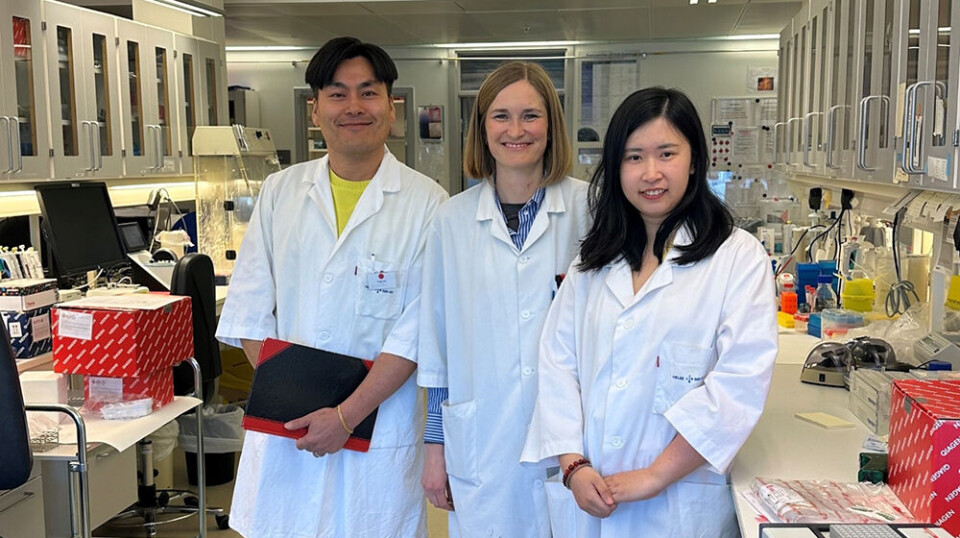THIS CONTENT IS BROUGHT TO YOU BY University of Oslo - read more
This molecule may be the key to slowing early ageing
Can research on a rare ageing disease and zombie cells teach us something about the normal ageing process?

Did you know that a small molecule called NAD+ plays a critical role in our ageing process? And that a lack of this molecule may cause you to age much faster than normal?
Imagine that your cells stop producing energy, or that your DNA struggles to repair itself. This is what happens as we grow older.
This is also the reality for people with Werner syndrome, a rare and serious genetic disorder that leads to premature ageing.
“Werner syndrome is an adult-onset progeria where individuals age more rapidly. By their 20s and 30s, the patients start to show greying and loss of hair, wrinkles, and appear much older than their actual age,” says researcher Sofie Lautrup at the University of Oslo and Akershus University Hospital.
Believe NAD+ can delay the ageing process

Patients with Werner syndrome experience typical age-related diseases and life-threatening complications already in their 30s and 40s. They experience major changes in their cells' metabolism, which means that the cells no longer behave normally.
“Our research has found that one reason for this is that they have lower levels of NAD+ in their mitochondria, the body’s cellular powerhouse,” says Lautrup.
She and her colleagues have analysed cells from patients with Werner syndrome in the lab. Their research reveals, for the first time, that these individuals have lower NAD+ levels in their mitochondria compared to healthy individuals.
The researchers also investigated whether supplementing NAD+ could help the cells function normally. The results were significant.
“We found that supplying NAD+ can stimulate stem cell growth and inhibit the premature ageing process in stem and skin cells from patients,” says Lautrup.
The results suggests that NAD+ supplementation could be a potential treatment for patients with Werner syndrome.
Could NAD+ also have a major impact on normal ageing?
We cannot live without NAD+
But what exactly is NAD+, and why is it essential for our bodies?
NAD+ is a molecule found in all living cells. It plays a vital role in many functions that occur in our cells.
“We need NAD+ to produce energy in our cells. It contributes to cellular health and metabolism by eliminating damaged mitochondria, and plays several other critical roles in our cells,” explains Lautrup, adding,
“Without NAD+, we literally cannot live.”
So even though NAD+ is a small molecule, it has a big impact on the body. It is almost like an invisible force that drives some of the most important processes in the body.
Using Werner syndrome to understand ageing
As we grow older, our NAD+ levels drop significantly. This is a natural part of the ageing process.
Previously, Lautrup and colleagues found that patients with Werner syndrome also have significantly lower NAD+ levels in their blood.
This condition accelerates the ageing process, making it a useful model for researchers to learn more about ageing.
Zombie cells are neither dead nor alive
A crucial function in our body is cell division. It is necessary for growth and for repairing damaged tissue. A natural part of normal ageing is that cells lose this ability to divide, and the process slows down. This is called senescence.
Werner syndrome is caused by mutations in a gene that is essential for maintaining our DNA and for cell division.
“One major hallmark of Werner syndrome is lack of proliferation and premature senescence. This means that cells without the werner protein divide poorly. Even though patients are relatively young, their cells stop dividing,” Lautrup explains.
She adds that you could compare senescence to zombie cells.
“They're neither dead nor alive, unable to perform their normal functions,” she says.
Researchers suspect that the low level of NAD+ in these patients contributes to the early onset of this zombie state.
Reversing the ageing process with NAD+
In the study, the researchers examined both stem cells and skin cells from Werner syndrome patients in the lab. These were compared to cells from healthy control subjects.
The goal was to see if supplying NAD+ could help the patients' cells regain the ability to divide, since cell division is important for good health.
Within just 24 hours, several signalling pathways associated with cell division were activated after the cells received a molecule that converts to NAD+.
“We found that NAD+ treatment can clearly reverse these features of the disease. The cells looked more like healthy cells,” says Lautrup. “NAD+ reduced the number of zombie cells and slowed down the ongoing senescence in the patients' cells.”
Fruit flies that received NAD+ lived longer
Previously, Lautrup and her colleagues conducted experiments with roundworms and fruit flies with Werner syndrome. The researchers gave the animals a molecule that becomes NAD+ in the cells.
They found that NAD+ treatment could stimulate and initiate cell division in the fruit flies. The mitochondria functioned better after receiving NAD+.
Even though the animals had Werner syndrome, they lived longer than expected.
“This finding in fruit flies made us wonder if NAD+ could restore cell division in the cells of actual patients,” she says.
Paving the way for new treatments
Lautrup’s research has already inspired the start of clinical trials with patients now underway on Werner syndrome and NAD+ in Japan. She is eagerly awaiting the results.
“We hope that this study, combined with our previous work on Werner syndrome and NAD+, will pave the way for new treatments not only for Werner syndrome but potentially for other ageing-related diseases,” she says.
Can we slow down the ageing process?
If researchers manage to restore cellular NAD+ levels, the goal is to slow down the ageing process.
“We use Werner syndrome as a model for normal ageing. We’re hopeful that our research will provide insights for studies on typical ageing. However, we still don't know if NAD+ can help slow down natural ageing in humans,” she says.
References:
Fang et al. NAD+ augmentation restores mitophagy and limits accelerated aging in Werner syndrome, Nature Communications, vol. 10, 2019. DOI: 10.1038/s41467-019-13172-8
Lautrup et al. Decreased mitochondrial NAD+ in WRN deficient cells links to dysfunctional proliferation, Aging, vol. 17, 2025. DOI: 10.18632/aging.206236
———
Read the Norwegian version of this article on forskning.no

This content is paid for and presented by the University of Oslo
This content is created by the University of Oslo's communication staff, who use this platform to communicate science and share results from research with the public. The University of Oslo is one of more than 80 owners of ScienceNorway.no. Read more here.
More content from the University of Oslo:
-
Mainland Europe’s largest glacier may be halved by 2100
-
AI makes fake news more credible
-
What do our brains learn from surprises?
-
"A photograph is not automatically either true or false. It's a rhetorical device"
-
Queer opera singers: “I was too feminine, too ‘gay.’ I heard that on opera stages in both Asia and Europe”
-
Putin’s dream of the perfect family





































